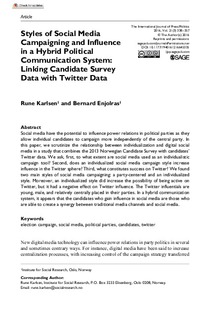Styles of Social Media Campaigning and Influence in a Hybrid Political Communication System: Linking Candidate Survey Data with Twitter Data
Peer reviewed, Journal article
Published version
Permanent lenke
http://hdl.handle.net/11250/2563378Utgivelsesdato
2016Metadata
Vis full innførselSamlinger
- Publikasjoner fra CRIStin [716]
- Tidsskriftpublikasjon [389]
Originalversjon
The International Journal of Press/Politics. 2016, 21 (3), 338-357. 10.1177/1940161216645335Sammendrag
Social media have the potential to influence power relations in political parties as they allow individual candidates to campaign more independently of the central party. In this paper, we scrutinize the relationship between individualization and digital social media in a study that combines the 2013 Norwegian Candidate Survey with candidates’ Twitter data. We ask, first, to what extent are social media used as an individualistic campaign tool? Second, does an individualized social media campaign style increase influence in the Twitter sphere? Third, what constitutes success on Twitter? We found two main styles of social media campaigning: a party-centered and an individualized style. Moreover, an individualized style did increase the possibility of being active on Twitter, but it had a negative effect on Twitter influence. The Twitter influentials are young, male, and relatively centrally placed in their parties. In a hybrid communication system, it appears that the candidates who gain influence in social media are those who are able to create a synergy between traditional media channels and social media. Styles of Social Media Campaigning and Influence in a Hybrid Political Communication System: Linking Candidate Survey Data with Twitter Data
